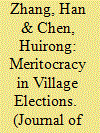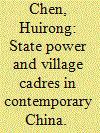|
|
|
Sort Order |
|
|
|
Items / Page
|
|
|
|
|
|
|
| Srl | Item |
| 1 |
ID:
181847


|
|
|
|
|
| Summary/Abstract |
Campaigns and bureaucratic institutions are two key modalities of national governance in China. Although previous studies have examined the relationship between campaigns and bureaucracy, how bureaucrats respond to campaigns and the effect of bureaucratic cooperation on state performance have not yet been sufficiently explored. This study seeks to develop a typology of bureaucratic responses to campaigns depending on various degrees of incentives and pressure derived from the said campaigns: substantive cooperation, performative cooperation, overzealous implementation, and bureaucratic inertia. Bureaucratic cooperation influences the effectiveness of the deployment of state bureaucracy, which transmutes into state performance. In order to illustrate the four types of bureaucratic cooperation and their respective implications for state performance, this article examines campaigns of land expropriation, poverty alleviation, village merging, and moral education in China. This research suggests that agency factors are important for institution building and state building.
|
|
|
|
|
|
|
|
|
|
|
|
|
|
|
|
| 2 |
ID:
167487


|
|
|
|
|
| Summary/Abstract |
Local governments in China face a fundamental ‘democracy dilemma’ in rural governance: although elected village cadres may not be capable or controllable, local governments cannot change or abolish village self-government, as enshrined in China’s Constitution and the national laws. However, there has recently been a new way of dealing with this dilemma for local governments: called the ‘Separation of Election and Employment’ (xuan pin fenli, SEE) [of village cadres]. Based on an in-depth case study of a Zhejiang county, this article argues that SEE is a typical type of institutional layering, which adds a new meritocratic village cadre management system onto existing village democracy. This is a path-dependent institutional change, emulating the Chinese Communist Party’s nomenklatura and bianzhi systems. This research has broader implications concerning gradual institutional change and political meritocracy.
|
|
|
|
|
|
|
|
|
|
|
|
|
|
|
|
| 3 |
ID:
140476


|
|
|
|
|
| Summary/Abstract |
In the case of land transfer in rural China, why do some village cadres act as entrepreneurs, some become middlemen between agribusinesses and peasants, and others choose to be passive bystanders? Based on comparative case studies in Shandong province, it is argued that state power, rather than village elections, informal solidary groups and economic benefits, is the dominant explanatory mechanism. This article suggests that our discussion of the state–village cadre relationship should not be limited to the control perspective. To achieve policy objectives, village cadres' ability and creativity are as important as motivation to local government. Substantial support makes village cadres more capable, and some degree of leeway is necessary for creativity. Local government relies on three forms of leverage (control, support and non-intervention) to address three issues (motivation, ability and creativity) in shaping behavioral patterns of village cadres.
|
|
|
|
|
|
|
|
|
|
|
|
|
|
|
|
|
|
|
|
|